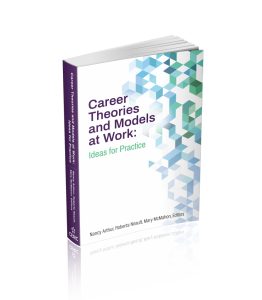My relationship with career theories and models has been a little bit like other relationships in life: some seem naturally compatible and I can’t imagine going through life without them; several have stood the test of time and seem as meaningful now as when I first encountered them; others have been inconsistent and I visit with them occasionally to try to rekindle interest. There are also some new theories and models that I have pursued, but which continue to feel awkward, while others have sparked energy and fresh perspectives.
Not all relationships will be ones that work well or bring joy to people’s lives. Correspondingly, not all theories have to be embraced. However, it is important to discover compatible theories and models that we can live well with over the years and that can be adapted to meeting clients’ needs in a rapidly changing world of work.
Classical theories are like those friends who are foundational in our lives. We discover their deeper layers through spending time getting to know them and doing things together. Just like visiting with old friends to see how they have changed and grown over the years, it is important to keep abreast of updates in the field to see if you still recognize newer versions of classical theories. At the same time, we can always enjoy the company of new friends in our lives. It is important to be open to newer perspectives and challenge oneself to stay updated to advance our professional practices with clients.
“It is important to discover compatible theories and models that we can live well with over the years and that can be adapted to meeting clients’ needs in a rapidly changing world of work.”
I invite career practitioners to take the time to recharge their relationship with career theories and models. Do you need more knowledge about specific theories or models or are you seeking information about how to apply them? For example, do you need new approaches to help your clients tell their career stories, engage with decision-making, plan a career project or navigate multiple cultural influences in their lives? Perhaps your clients are interested in overcoming some past obstacles that seem to block their career pathways. Or, maybe you would like to consider ways of adapting theories and models for group interventions.

Our clients’ lives are complex and it is important that practitioners ground their interventions in theories and models with practical applications. In each chapter of Career Theories and Models that Work: Ideas for Practice, authors have written an original case vignette that illustrates a wide variety of clients’ presenting issues. The authors have also written about ways to apply theories and models in practical and transparent ways. Some readers might enjoy reviewing the practice points at the end of the chapters to spark curiosity, and then work back through the content to expand connections between theory and practice. Or, readers might explore some of the case vignettes to expand their knowledge of diverse populations and career-related challenges. Selecting one chapter or reviewing them all will help readers to self-assess their current standing in relation to contemporary career theories and models.
We all need good friends in life. It is important that we don’t take them for granted – just like our understanding of career theories and models. Practitioners and their clients benefit from a solid foundation of knowledge to explore career development. When was the last time that you recharged your relationship to career theories and models?






